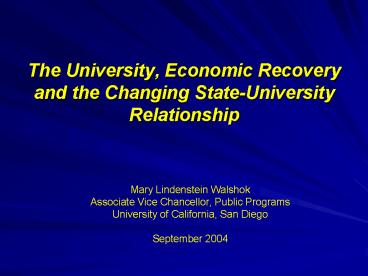The University, Economic Recovery and the Changing StateUniversity Relationship - PowerPoint PPT Presentation
1 / 14
Title:
The University, Economic Recovery and the Changing StateUniversity Relationship
Description:
Need ways to marry the academic and the civic value of knowledge ... Building problem focused/interactive/dialogue systems rather than teaching/learning systems ... – PowerPoint PPT presentation
Number of Views:23
Avg rating:3.0/5.0
Title: The University, Economic Recovery and the Changing StateUniversity Relationship
1
The University, Economic Recovery and the
Changing State-University Relationship
- Mary Lindenstein Walshok
- Associate Vice Chancellor, Public Programs
- University of California, San Diego
- September 2004
2
The Problem with the Three Legged Stool Metaphor
- Research, teaching and service
intrinsic/extrinsic rewards vary and are
differentially enforced for each activity - Increasingly the discovery, development,
application and integration of knowledge in
society is a function of synergies between the
three - these are no longer parallel processes - Sticking to this metaphor puts focus on faculty
rewards, on service learning, and can create an
artificial tension between theory and practice.
Need ways to marry the academic and the civic
value of knowledge
3
The Problem with Taking for GrantedExisting
Institutions and Established Professions and
Credentials
- Fields represent ideologies and socialization
practices not just skills and competencies - Marketplace makes obsolete many professions/skill
areas such as subspecialties of
law/engineering/medicine/telecom - Education/social work/urban planning lacking
marketplace checks often change not at all,
becoming social service and civic pleaders rather
than adapters and change agents - Failure to anticipate and capture emerging
knowledge and competency needs
4
The Context
- A World in Perpetual Motion
- The technological and demographic imperatives
shaping the new forms of engagement - All Knowledge is Not the Same
- The substance, shape, form, communicability
and rate of change varies in different knowledge
spheres - The Disconnect Between the Ways of the World
and Life in the Academy
5
Strategic Issues
- Revisiting Core Cultural Assumptions
- Knowledge/expertise resides in many places,
not just the faculty - The facultys commitment to truth, testing ideas
and standards is as important as specific
expertise - Universities are knowledge hubs, not exclusive
providers
6
Strategic Issues
- What Business Are We In?
- Research and instruction versus knowledge
discovery, development and integration into
practice and job creation - Innovation and job creation
- Skills and competencies for the workplace,
the professions and leadership - Civic and cultural competencies
7
Strategic Issues
- Whats Wrong with How Were Organized?
- The structure and organization of today versus
what wed need to support a broader agenda - Interactive/dialogue/shared agenda vs. one-way
outreach - Collaboratively developed research and teaching
agendas across communities and across
disciplines - Enabling structure and infrastructure of support
and innovative/ multiple revenue streams vs.
systems which only support on campus
instructional and faculty driven research - Teams of competency, webs of talent, new kinds of
knowledge workers, incentives and rewards vs.
only tenured faculty
8
Principles of Practice
- The First Step to Engagement Becoming a Learning
as Well as a Teaching Institution - Expanding Capacity Building Enabling
Institutional Mechanisms - Expanding the Cadre of Academic Professionals
(Knowledge Workers) Doing the Work of the Engaged
University
9
The Opportunity of the Moment is to
Find Ways to Marry the Universitys Civic and
Intellectual Missions
- Building problem focused/interactive/dialogue
systems rather than teaching/learning systems - Regionalism the community as a knowledge
resource as well as a laboratory for learning,
mapping diversity, tracking economic clusters,
assessing needs and capabilities - Building internally and externally collaborative
planning, funding and delivery mechanisms
10
Seeing Economy/Community/Organizations/
Professions In New Ways
- Fluid and transforming
- Cycles of rising and declining value in fields
such as social work, philanthropy, education as
well as technical and science based fields - Facilitating transitions as well as educating for
competencies - broader agenda - New problems needing new solutions and old
problems needing new solutions - Bronx Home Healthcare Cooperative
- Impermanence of technology/institutions/leadershi
p - New intermediary strategies and mediating
institutions - New forms of leadership and civic entrepreneurs
11
Re-Imagining Models for Developing Internal and
External Stakeholders and Revenue Sources
- Renewed focus on the power of ideas
- Convening, collaborating and participating,
not just teaching - De-standardizing our own activities - getting
beyond instruction, i.e. units, credit,
requirements, virtual or actual classrooms - Imagining more broadly what it means to be part
of a learning community - New kinds of knowledge professionals
12
The Power of Local Civic Institutions and
Professionals
- Building community mechanisms that cross
professional and disciplinary boundaries, i.e.
UCSD CONNECT - Enhancing knowledge flows through research
briefings, newsletters, etc. - Linking entrepreneurial know-how and capital to
promising innovations and start-up companies
through events and activities that build
knowledge and capacity - Showcasing regional capacity to potential
national and global investors and partners
through specific business opportunity events - Utilizing a privatized volunteer driven model of
regional and global networking to achieve all of
the above
13
Outcomes Worth Tracking
- Level of regional and external investment in
local companies - New company formation, growth and sustainability
- Employment growth in high wage technology and
business service clusters - Global alliances and partnerships formed around
emerging companies in the region - Retention and attraction of knowledge workers
- Increases in gross revenues of local companies
- Increases in tax dollars/philanthropic
investments in the region
14
- This presentation was made at a forum held at
the University of Wisconsin-Madison on September
22, 2004. - The event was sponsored by the Wisconsin Center
for the Advancement of Postsecondary Education
(WISCAPE).































